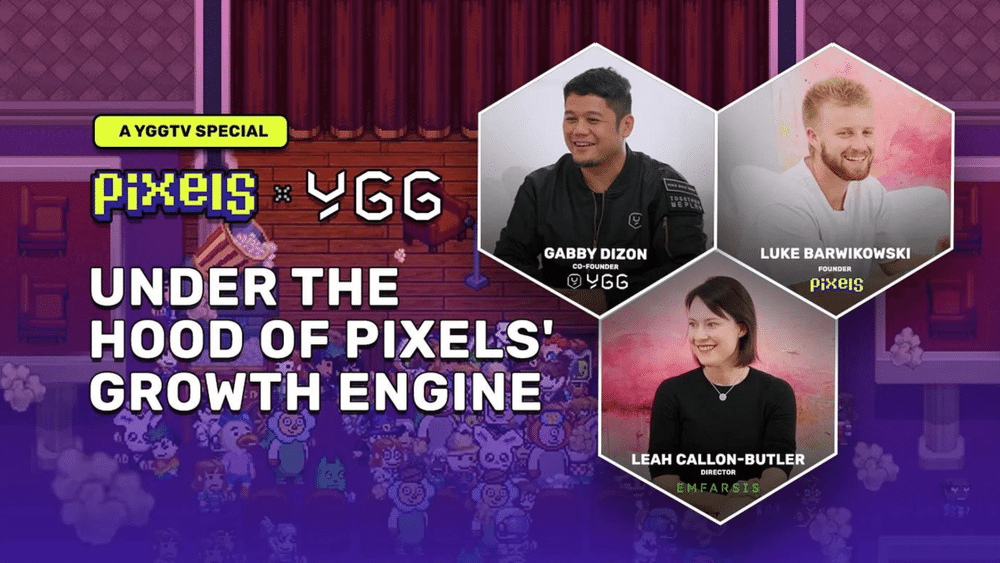Exploring the Dynamics of web3 Gaming: Learnings from pixels‘ Thriving Ecosystem
In the rapidly expanding realm of web3 gaming, the innovative strides made by game developers like pixels have caught the attention of the global gaming community. A fascinating roundtable discussion featuring Gabby Dizon from Yield Guild games and Luke Barwikowski of pixels shed light on the intricate components of building web3-native communities, incentive schemes, and engagement models. Their conversation, skillfully directed by Leah Callon-Butler, unfolded revelations and strategies that have notably contributed to the ascent of pixels.
pixels emerges as a captivating sandbox experience, merging the allure of farming, gathering, and exploration within a blockchain-powered universe. It brilliantly intertwines blockchain ownership with player progression, making every achievement not just a milestone but a tangible asset. As a game created on the Ronin blockchain and accessible through a browser, pixels champions itself as a beacon for ushering millions into the vibrant world of web3 gaming.
pixels‘ Migration to Ronin Network Sparks Adoption
The strategic shift of pixels from the Polygon platform to the Ronin Network marked a pivotal chapter in its journey, significantly bolstering its presence, especially in the Philippines. This move capitalized on the region’s booming web3 game participation, drawing inspiration from the success stories like Axie Infinity. By November 2023, pixels had astonishingly reached 100k daily active users, a testament to its growing appeal, which further amplified to an impressive 1 million monthly users by March 2024.
Role of Southeast Asian (SEA) Gaming Market
The SEA region, with its diverse cultures and a robust appetite for gaming, has emerged as a forefront in the video game industry’s global landscape. The area’s inclination towards gaming, live streaming, and esports has made it an attractive market for developers and investors. Significantly, the Philippines has been at the cradle of web3 gaming adoption, consistently leading global interest in this new gaming paradigm. This keen interest was further highlighted by the massive turnout for a pixels AMA session tailored for the Filipino audience, drawing double the usual engagement.
Birth of the Play-to-airdrop (P2A) Trend
In a bold move to redefine player incentives, pixels introduced the Play-to-airdrop model, a novel concept prioritizing active engagement and progress within the game for token distribution. This strategy aimed at rewarding genuine participation, curbing the tendency for immediate sell-offs and fostering sustained user retention. Such pioneering approaches underscore the game’s commitment to nurturing a vibrant community, setting pixels apart in the web3 gaming landscape.
Play-to-earn (P2E) Remains Popular Despite Critics
Despite facing criticisms, the enthusiasm surrounding Play-to-earn (P2E) within web3 gaming remains unshaken. Drawing parallels with iconic MMORPGs, the P2E model’s essence lies in adding a layer of economic interaction to gaming, enriching player engagement through the trade and ownership of in-game assets. pixels‘ nuanced approach to analyzing and rewarding player activity stands as a testament to the potential of P2E in enlarging the gaming industry’s horizon, presently valued at about $200 billion.
Enhancing Engagement Through Social Activities
Understanding the importance of community, pixels incorporates daily activities and special events like ‘energy parties’ to foster a sense of belongingness among its players. These gatherings aren’t just fun; they’re a cornerstone for building an active, tight-knit community, proving vital for the game’s sustained interest and growth.
Importance of Building in Public Despite Challenges
pixels adopts an open development ethos, engaging regularly with its community for feedback and suggestions. This transparent approach, despite its challenges, has been crucial in aligning game development with user expectations, building trust, and swiftly addressing concerns, thereby ensuring a receptive and content player base.
Significance of an On-Chain Reputation
The introduction of soulbound tokens (SBTs) by Yield Guild games as a reputation system marks an innovative step in recognizing and rewarding player achievements and behavior on-chain. This system benefits pixels by identifying high-value players who contribute positively to the ecosystem, illustrating the potential of on-chain reputation mechanisms in enhancing the value and security of web3 games.
Final Thoughts
Through the lens of the discussion between Gabby Dizon and Luke Barwikowski, it’s clear that pixels‘ significant strides in web3 gaming owe much to strategic network migration, inventive community engagement strategies, and a pioneering reward system. Their journey offers profound insights for game developers seeking to flourish in this new age of gaming, highlighting the essence of adaptable market strategies, genuine player interaction, and continuous community-driven development.
Amidst the ever-evolving web3 landscape, these learnings pave the way for emerging games to chart their course towards successful community building and sustainable game development. For those looking to delve deeper into these strategic discussions, be sure to watch the detailed interview.
